- Home
- Ernest Hemingway
In Our Time Page 4
In Our Time Read online
Page 4
"Don't you like my pan?" the man asked.
Nick was embarrassed.
"Sure," he said.
"Look here!" The man took off his cap.
He had only one ear. It was thickened and tight against the side of his head. Where the other ear should have been there was a stump.
"Ever see one like that?"
"No," said Nick. It made him a little sick.
"I could take it," the man said. "Don't you think I could take it, kid?"
"You bet!"
"They all bust their hands on me," the little man said. "They couldn't hurt me."
He looked at Nick. "Sit down," he said. "Want to eat?"
"Don't bother," Nick said. "I'm going on to the town."
"Listen!" the man said. "Call me Ad."
"Sure!"
"Listen," the little man said. "I'm not quite right."
"What's the matter?"
"I'm crazy."
He put on his cap. Nick felt like laughing.
"You're all right," he said.
"No, I'm not. I'm crazy. Listen, you ever been crazy?"
"No," Nick said. "How does it get you?"
"I don't know," Ad said. "When you got it you don't know about it. You know me, don't you?"
"No."
"I'm Ad Francis."
"Honest to God?"
"Don't you believe it?"
"Yes."
Nick knew it must be true.
"You know how I beat them?"
"No," Nick said.
"My heart's slow. It only beats forty a minute. Feel it."
Nick hesitated.
"Come on," the man took hold of his hand. "Take hold of my wrist. Put your fingers there."
The little man's wrist was thick and the muscles bulged above the bone. Nick felt the slow pumping under his fingers.
"Got a watch?"
"No."
"Neither have I," Ad said. "It ain't any good if you haven't got a watch."
Nick dropped his wrist.
"Listen," Ad Francis said. "Take ahold again. You count and I'll count up to sixty."
Feeling the slow hard throb under his fingers Nick started to count. He heard the little man counting slowly, one, two, three, four, five, and on--aloud.
"Sixty," Ad finished. "That's a minute. What did you make it?"
"Forty," Nick said.
"That's right," Ad said happily. "She never speeds up."
A man dropped down the railroad embankment and came across the clearing to the fire.
"Hello, Bugs!" Ad said.
"Hello!" Bugs answered. It was a negro's voice. Nick knew from the way he walked that he was a negro. He stood with his back to them, bending over the fire. He straightened up.
"This is my pal Bugs," Ad said. "He's crazy, too."
"Glad to meet you," Bugs said. "Where you say you're from?"
"Chicago," Nick said.
"That's a fine town," the negro said. "I didn't catch your name."
"Adams. Nick Adams."
"He says he's never been crazy, Bugs," Ad said.
"He's got a lot coming to him," the negro said. He was unwrapping a package by the fire.
"When are we going to eat, Bugs?" the prizefighter asked.
"Right away."
"Are you hungry, Nick?"
"Hungry as hell."
"Hear that, Bugs?"
"I hear most of what goes on."
"That ain't what I asked you."
"Yes. I heard what the gentleman said."
Into a skillet he was laying slices of ham. As the skillet grew hot the grease sputtered and Bugs, crouching on long nigger legs over the fire, turned the ham and broke eggs into the skillet, tipping it from side to side to baste the eggs with the hot fat.
"Will you cut some bread out of that bag, Mister Adams?" Bugs turned from the fire.
"Sure."
Nick reached in the bag and brought out a loaf of bread. He cut six slices. Ad watched him and leaned forward.
"Let me take your knife, Nick," he said.
"No, you don't," the negro said. "Hang onto your knife, Mister Adams."
The prizefighter sat back.
"Will you bring me the bread, Mister Adams?" Bugs asked. Nick brought it over.
"Do you like to dip your bread in the ham fat?" the negro asked.
"You bet!"
"Perhaps we'd better wait until later. It's better at the finish of the meal. Here."
The negro picked up a slice of ham and laid it on one of the pieces of bread, then slid an egg on top of it.
"Just close that sandwich, will you, please, and give it to Mister Francis."
Ad took the sandwich and started eating.
"Watch out how that egg runs," the negro warned. "This is for you, Mister Adams. The remainder for myself."
Nick bit into the sandwich. The negro was sitting opposite him beside Ad. The hot fried ham and eggs tasted wonderful.
"Mister Adams is right hungry," the negro said. The little man whom Nick knew by name as a former champion fighter was silent. He had said nothing since the negro had spoken about the knife.
"May I offer you a slice of bread dipped right in the hot ham fat?" Bugs said.
"Thanks a lot."
The little white man looked at Nick.
"Will you have some, Mister Adolph Francis?" Bugs offered from the skillet.
Ad did not answer. He was looking at Nick.
"Mister Francis?" came the nigger's soft voice.
Ad did not answer. He was looking at Nick.
"I spoke to you, Mister Francis," the nigger said softly.
Ad kept on looking at Nick. He had his cap down over his eyes. Nick felt nervous.
"How the hell do you get that way?" came out from under the cap sharply at Nick.
"Who the hell do you think you are? You're a snotty bastard. You come in here where nobody asks you and eat a man's food and when he asks to borrow a knife you get snotty."
He glared at Nick, his face was white and his eyes almost out of sight under the cap.
"You're a hot sketch. Who the hell asked you to butt in here?"
"Nobody."
"You're damn right nobody did. Nobody asked you to stay either. You come in here and act snotty about my face and smoke my cigars and drink my liquor and then talk snotty. Where the hell do you think you get off?"
Nick said nothing. Ad stood up.
"I'll tell you, you yellow-livered Chicago bastard. You're going to get your can knocked off. Do you get that?"
Nick stepped back. The little man came toward him slowly, stepping flat-footed forward, his left foot stepping forward, his right dragging up to it.
"Hit me," he moved his head. "Try and hit me."
"I don't want to hit you."
"You won't get out of it that way. You're going to take a beating, see? Come on and lead at me."
"Cut it out," Nick said.
"All right, then, you bastard."
The little man looked down at Nick's feet. As he looked down the negro, who had followed behind him as he moved away from the fire, set himself and tapped him across the base of the skull. He fell forward and Bugs dropped the cloth-wrapped blackjack on the grass. The little man lay there, his face in the grass. The negro picked him up, his head hanging, and carried him to the fire. His face looked bad, the eyes open. Bugs laid him down gently.
"Will you bring me the water in the bucket, Mister Adams," he said. "I'm afraid I hit him just a little hard."
The negro splashed water with his hand on the man's face and pulled his ears gently. The eyes closed.
Bugs stood up.
"He's all right," he said. "There's nothing to worry about. I'm sorry, Mister Adams."
"It's all right." Nick was looking down at the little man. He saw the blackjack on the grass and picked it up. It had a flexible handle and was limber in his hand. It was made of worn black leather with a handkerchief wrapped around the heavy end.
"That's a whalebone handle,"
the negro smiled. "They don't make them any more. I didn't know how well you could take care of yourself and, anyway, I didn't want you to hurt him or mark him up no more than he is."
The negro smiled again.
"You hurt him yourself."
"I know how to do it. He won't remember nothing of it. I have to do it to change him when he gets that way."
Nick was still looking down at the little man, lying, his eyes closed in the firelight. Bugs put some wood on the fire.
"Don't you worry about him none, Mister Adams. I seen him like this plenty of times before."
"What made him crazy?" Nick asked.
"Oh, a lot of things," the negro answered from the fire. "Would you like a cup of this coffee, Mister Adams?"
He handed Nick the cup and smoothed the coat he had placed under the unconscious man's head.
"He took too many beatings, for one thing," the negro sipped the coffee. "But that just made him sort of simple. Then his sister was his manager and they was always being written up in the papers all about brothers and sisters and how she loved her brother and how he loved his sister, and then they got married in New York and that made a lot of unpleasantness."
"I remember about it."
"Sure. Of course they wasn't brother and sister no more than a rabbit, but there was a lot of people didn't like it either way and they commenced to have disagreements, and one day she just went off and never come back."
He drank the coffee and wiped his lips with the pink palm of his hand.
"He just went crazy. Will you have some more coffee, Mister Adams?"
"Thanks."
"I seen her a couple of times," the negro went on. "She was an awful good-looking woman. Looked enough like him to be twins. He wouldn't be bad-looking without his face all busted."
He stopped. The story seemed to be over.
"Where did you meet him?" asked Nick.
"I met him in jail," the negro said. "He was busting people all the time after she went away and they put him in jail. I was in for cuttin' a man."
He smiled, and went on soft-voiced:
"Right away I liked him and when I got out I looked him up. He likes to think I'm crazy and I don't mind. I like to be with him and I like seeing the country and I don't have to commit no larceny to do it. I like living like a gentleman."
"What do you all do?" Nick asked.
"Oh, nothing. Just move around. He's got money."
"He must have made a lot of money."
"Sure. He spent all his money, though. Or they took it away from him. She sends him money."
He poked up the fire.
"She's a mighty fine woman," he said. "She looks enough like him to be his own twin."
The negro looked over at the little man, lying breathing heavily. His blond hair was down over his forehead. His mutilated face looked childish in repose.
"I can wake him up any time now, Mister Adams. If you don't mind I wish you'd sort of pull out. I don't like to not be hospitable, but it might disturb him back again to see you. I hate to have to thump him and it's the only thing to do when he gets started. I have to sort of keep him away from people. You don't mind, do you, Mister Adams? No, don't thank me, Mister Adams. I'd have warned you about him but he seemed to have taken such a liking to you and I thought things were going to be all right. You'll hit a town about two miles up the track. Mancelona they call it. Good-bye. I wish we could ask you to stay the night but it's just out of the question. Would you like to take some of that ham and some bread with you? No? You better take a sandwich," all this in a low, smooth, polite nigger voice.
"Good. Well, good-bye, Mister Adams. Good-bye and good luck!"
Nick walked away from the fire across the clearing to the railway tracks. Out of the range of the fire he listened. The low soft voice of the negro was talking. Nick could not hear the words. Then he heard the little man say, "I got an awful headache, Bugs."
"You'll feel better, Mister Francis," the negro's voice soothed.
"Just you drink a cup of this hot coffee."
Nick climbed the embankment and started up the track. He found he had a ham sandwich in his hand and put it in his pocket. Looking back from the mounting grade before the track curved into the hills he could see the firelight in the clearing.
Chapter VI
Nick sat against the wall of the church where they had dragged him to be clear of machine-gun fire in the street. Both legs stuck out awkwardly. He had been hit in the spine. His face was sweaty and dirty. The sun shone on his face. The day was very hot. Rinaldi, big backed, his equipment sprawling, lay face downward against the wall. Nick looked straight ahead brilliantly. The pink wall of the house opposite had fallen out from the roof, and an iron bedstead hung twisted toward the street. Two Austrian dead lay in the rubble in the shade of the house. Up the street were other dead. Things were getting forward in the town. It was going well. Stretcher bearers would be along any time now. Nick turned his head carefully and looked at Rinaldi. "Senta Rinaldi. Senta. You and me we've made a separate peace." Rinaldi lay still in the sun breathing with difficulty. "Not patriots." Nick turned his head carefully away smiling sweatily. Rinaldi was a disappointing audience.
A Very Short Story
One hot evening in Padua they carried him up onto the roof and he could look out over the top of the town. There were chimney swifts in the sky. After a while it got dark and the searchlights came out. The others went down and took the bottles with them. He and Luz could hear them below on the balcony. Luz sat on the bed. She was cool and fresh in the hot night.
Luz stayed on night duty for three months. They were glad to let her. When they operated on him she prepared him for the operating table; and they had a joke about friend or enema. He went under the anaesthetic holding tight on to himself so he would not blab about anything during the silly, talky time. After he got on crutches he used to take the temperatures so Luz would not have to get up from the bed. There were only a few patients, and they all knew about it. They all liked Luz. As he walked back along the halls he thought of Luz in his bed.
Before he went back to the front they went into the Duomo and prayed. It was dim and quiet, and there were other people praying. They wanted to get married, but there was not enough time for the banns, and neither of them had birth certificates. They felt as though they were married, but they wanted every one to know about it, and to make it so they could not lose it.
Luz wrote him many letters that he never got until after the armistice. Fifteen came in a bunch to the front and he sorted them by the dates and read them all straight through. They were all about the hospital, and how much she loved him and how it was impossible to get along without him and how terrible it was missing him at night.
After the armistice they agreed he should go home to get a job so they might be married. Luz would not come home until he had a good job and could come to New York to meet her. It was understood he would not drink, and he did not want to see his friends or any one in the States. Only to get a job and be married. On the train from Padua to Milan they quarrelled about her not being willing to come home at once. When they had to say good-bye, in the station at Milan, they kissed good-bye, but were not finished with the quarrel. He felt sick about saying good-bye like that.
He went to America on a boat from Genoa. Luz went back to Pordenone to open a hospital. It was lonely and rainy there, and there was a battalion of arditi quartered in the town. Living in the muddy, rainy town in the winter, the major of the battalion made love to Luz, and she had never known Italians before, and finally wrote to the States that theirs had been only a boy and girl affair. She was sorry, and she knew he would probably not be able to understand, but might some day forgive her, and be grateful to her, and she expected, absolutely unexpectedly, to be married in the spring. She loved him as always, but she realized now it was only a boy and girl love. She hoped he would have a great career, and believed in him absolutely. She knew it was for the best.
The major
did not marry her in the spring, or any other time. Luz never got an answer to the letter to Chicago about it. A short time after he contracted gonorrhea from a sales girl in a loop department store while riding in a taxicab through Lincoln Park.
Chapter VII
While the bombardment was knocking the trench to pieces at Fossalta, he lay very flat and sweated and prayed oh jesus christ get me out of here. Dear jesus please get me out. Christ please please please christ. If you'll only keep me from getting killed I'll do anything you say. I believe in you and I'll tell every one in the world that you are the only one that matters. Please please dear jesus. The shelling moved further up the line. We went to work on the trench and in the morning the sun came up and the day was hot and muggy and cheerful and quiet. The next night back at Mestre he did not tell the girl he went upstairs with at the Villa Rossa about Jesus. And he never told anybody.
Soldier's Home
Krebs went to the war from a Methodist college in Kansas. There is a picture which shows him among his fraternity brothers, all of them wearing exactly the same height and style collar. He enlisted in the Marines in 1917 and did not return to the United States until the second division returned from the Rhine in the summer of 1919.
There is a picture which shows him on the Rhine with two German girls and another corporal. Krebs and the corporal look too big for their uniforms. The German girls are not beautiful. The Rhine does not show in the picture.
By the time Krebs returned to his home town in Oklahoma the greeting of heroes was over. He came back much too late. The men from the town who had been drafted had all been welcomed elaborately on their return. There had been a great deal of hysteria. Now the reaction had set in. People seemed to think it was rather ridiculous for Krebs to be getting back so late, years after the war was over.
At first Krebs, who had been at Belleau Wood, Soissons, the Champagne, St. Mihiel and in the Argonne did not want to talk about the war at all. Later he felt the need to talk but no one wanted to hear about it. His town had heard too many atrocity stories to be thrilled by actualities. Krebs found that to be listened to at all he had to lie, and after he had done this twice he, too, had a reaction against the war and against talking about it. A distaste for everything that had happened to him in the war set in because of the lies he had told. All of the times that had been able to make him feel cool and clear inside himself when he thought of them; the times so long back when he had done the one thing, the only thing for a man to do, easily and naturally, when he might have done something else, now lost their cool, valuable quality and then were lost themselves.

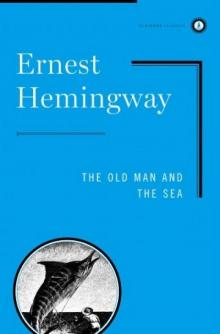 The Old Man and the Sea
The Old Man and the Sea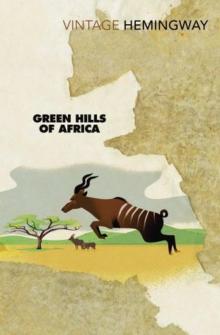 Green Hills of Africa
Green Hills of Africa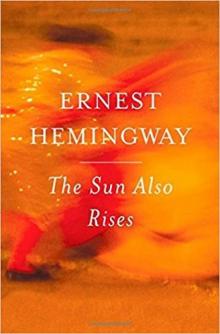 The Sun Also Rises
The Sun Also Rises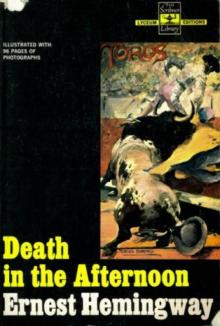 Death in the Afternoon
Death in the Afternoon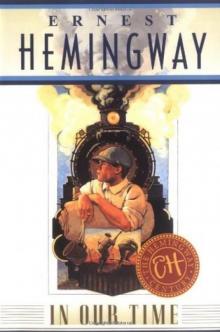 In Our Time
In Our Time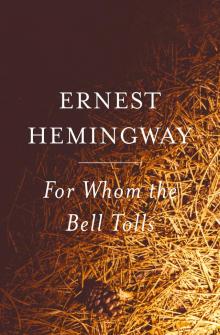 For Whom the Bell Tolls
For Whom the Bell Tolls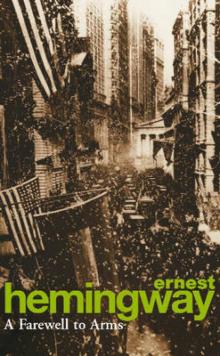 A Farewell to Arms
A Farewell to Arms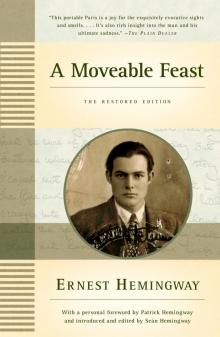 A Moveable Feast
A Moveable Feast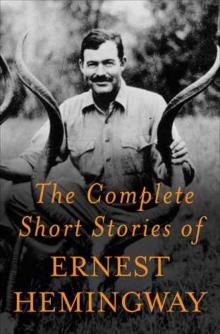 The Complete Short Stories of Ernest Hemingway
The Complete Short Stories of Ernest Hemingway Big Two-Hearted River
Big Two-Hearted River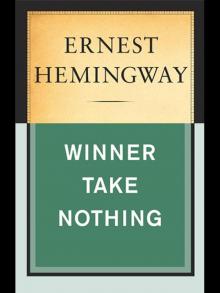 Winner Take Nothing
Winner Take Nothing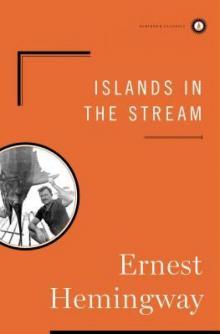 Islands in the Stream
Islands in the Stream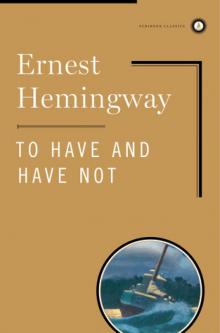 To Have and Have Not
To Have and Have Not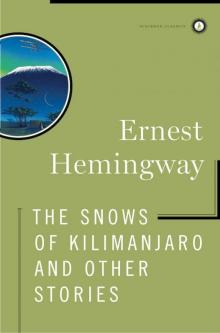 The Snows of Kilimanjaro and Other Stories
The Snows of Kilimanjaro and Other Stories Across the River and Into the Trees
Across the River and Into the Trees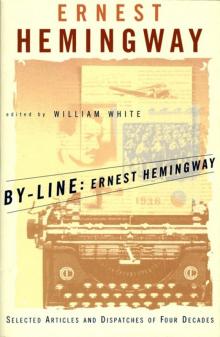 By-Line Ernest Hemingway
By-Line Ernest Hemingway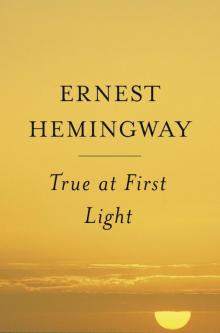 True at First Light
True at First Light Men Without Women
Men Without Women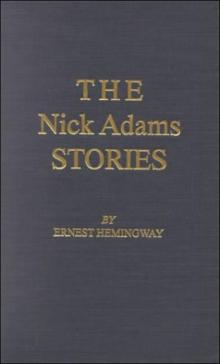 The Nick Adams Stories
The Nick Adams Stories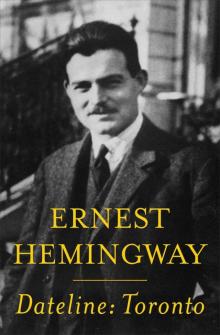 Dateline- Toronto
Dateline- Toronto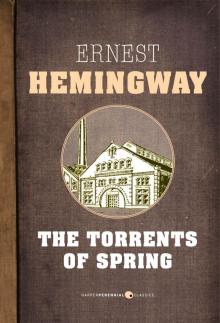 The Torrents of Spring
The Torrents of Spring Short Stories
Short Stories